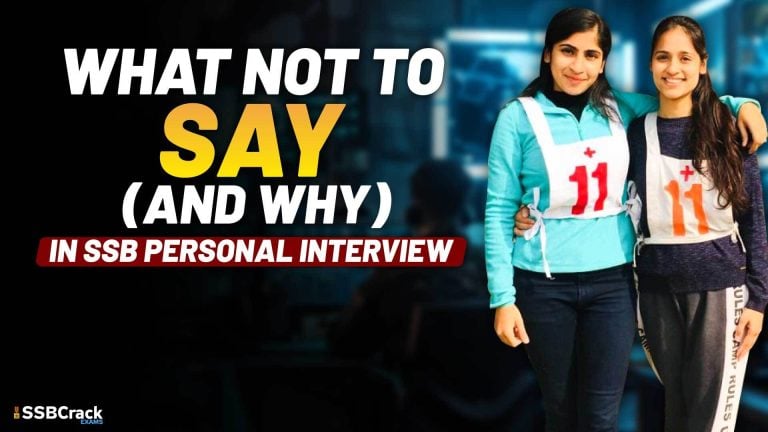Among the 15 Officer Like Qualities (OLQs) assessed in the SSB Interview, one of the most crucial for group tasks and leadership development is the Ability to Influence the Group. This quality goes beyond mere speaking skills — it reflects the aspirant’s ability to lead a team, gain trust, promote cooperation, and drive results through mutual respect and logic.
In the Armed Forces, officers constantly lead teams — often in high-pressure and high-stakes environments. The ability to influence a group positively and effectively is what transforms an individual into a natural leader.
In this article, we’ll explore:
- What Ability to Influence the Group means
- Where it is most prominently evaluated in the SSB
- How assessors judge this quality
- Ways to showcase it naturally in front of the board
- Practical tasks to develop this OLQ at home, school, college, or workplace
What Is Ability to Influence the Group?
Ability to Influence the Group refers to an individual’s capability to convince, inspire, guide, or lead a group toward a common goal or solution through effective communication, logic, empathy, and presence.
It is not about dominating others — it’s about winning their support and aligning the group through:
- Logical and structured communication
- Active listening
- Emotional intelligence
- Confidence without aggression
- Decision-making and solution-oriented thinking
A candidate who can influence a group:
- Brings the team together
- Helps resolve conflicts
- Guides the discussion productively
- Is heard, respected, and often followed by the group
Where Is This OLQ Evaluated in the SSB Interview?
1. GTO Tasks – The Core Zone of Influence
🔹 Group Discussion (GD)
- Can you drive the conversation forward logically?
- Do others respond to or support your points?
- Are you persuasive without being forceful?
🔹 Group Planning Exercise (GPE)
- Are your ideas practical and convincing enough for the group to accept?
- Can you mediate differences and form a consensus?
🔹 PGT, HGT, FGT (Outdoor Tasks)
- Are you guiding or motivating the group during problem-solving?
- Do others follow your lead or instructions voluntarily?
🔹 Command Task
- Can you give clear and confident instructions to your subordinates?
- Do they trust your leadership and follow without confusion?
2. Interview
- Do you narrate situations where you led a team or influenced peers?
- Have you resolved conflicts or inspired group effort?
- Do you hold positions like captain, leader, event coordinator?
3. Psychological Tests
TAT (Thematic Apperception Test)
- Does your character unite and lead people effectively?
SRT (Situation Reaction Test)
- Do you guide others during confusion, accidents, or group tasks?
SDT (Self-Description Test)
- Do friends, teachers, or colleagues describe you as someone who influences others positively?
How Is It Evaluated?
Assessors observe:
- Whether others listen to you naturally
- How you handle group conflict
- Whether you stay calm and persuasive under pressure
- Your ability to balance logic with empathy
- Your influence without overpowering others
It’s not about being the most vocal — it’s about being the most effective voice in the group.
How Can Aspirants Showcase This OLQ in SSB?
✔️ In GD & GPE:
- Start the discussion with a clear structure or unique point
- Acknowledge others’ views while asserting your own
- Summarize group inputs and suggest a unifying conclusion
✔️ In Outdoor Tasks:
- Help members physically and mentally during tasks
- Step up when the group is confused
- Motivate and involve quiet group members
✔️ In Command Task:
- Speak with clarity, confidence, and care
- Praise or support subordinates when they help — it builds trust
✔️ In Interview:
- Share real-life examples where you brought a group together or helped lead through a challenge
How to Develop Ability to Influence the Group in Daily Life
At Home:
- Lead Family Discussions or Events
- Suggest and organize family outings, celebrations, or problem-solving at home
- 🔹 Practice communication and diplomacy
- Mediate Disagreements
- Help resolve sibling arguments or family tensions respectfully
- 🔹 Develops empathy-driven leadership
At School/College/University:
- Lead Team Projects, Clubs or Events
- Volunteer as captain or coordinator
- Guide team efforts from planning to execution
- 🔹 Develops respect-based influence
- Mentor Juniors or Peers
- Help classmates or guide juniors through academics or competitions
- 🔹 Strengthens trust and positive influence
- Organize Debates or Group Discussions
- Learn to structure arguments, listen actively, and engage others logically
- 🔹 Builds verbal persuasion and group control
At Workplace/Internship:
- Lead or Contribute in Team Projects
- Help align the team toward shared goals or deadlines
- 🔹 Boosts collaborative influence
- Speak in Meetings Confidently
- Raise logical points; support teammates’ suggestions
- 🔹 Builds professional respect and assertiveness
- Handle Team Conflict or Frustration
- Step in to mediate or boost morale in pressure situations
- 🔹 Develops practical leadership presence
Final Thoughts
The Ability to Influence the Group is the heart of leadership. It reflects how well you connect, guide, inspire, and elevate others, not through domination, but through understanding, vision, and action. At the SSB, this quality is the fine line between an intelligent participant and a born leader.
If you can listen without ego, speak with logic, act with purpose, and lift others up, you’ll not only influence the group — you’ll command its respect. And that’s exactly what the SSB looks for in a future officer.







